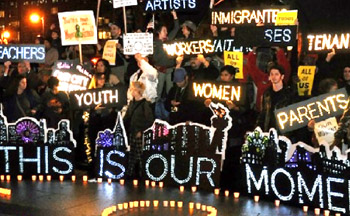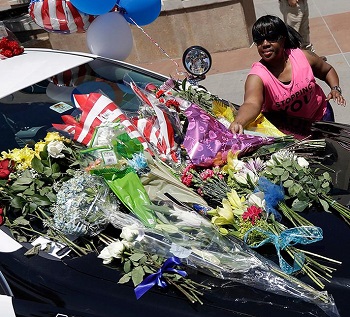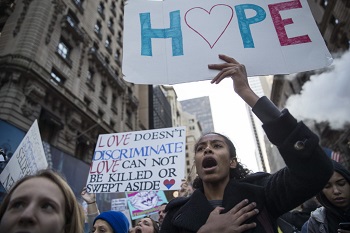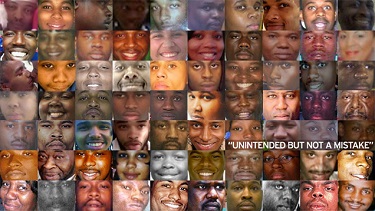Home » working class (Page 2)
Category Archives: working class
A Simple Faith
by Wesley V. Hromatko
Some time ago Doug Muder in the UU World doubted if our church could speak to the average working man. He thought that we didn’t have anything to say to his father who made cattle feed in Illinois. If his father came to church he wouldn’t find anyone he could talk with. He also said that you wouldn’t find a trucker or anybody with callused hands. A harsh life needed a harsh religion. Being one of us works for teachers and professors but not for regular people. He thinks we exclude people by class. Now Doug Muder is a UU and hopes we have a wider message, but he doesn’t know what it is. To say the least, I was floored.
I hadn’t noticed the article right away probably because it came out the year my father died. My father was a UU farmer. When he started working away from home he was a hired man. He cleaned barns, fed pigs, delivered calves and milked cows. He told about working for several weeks but was paid barely enough for gas to get home. Why my father joined our church is part of my answer to this article.
My father had grown up the way the columnist had. Then it came time for the dreaded confirmation classes. He couldn’t understand what he was supposed to agree to. Well, he had no trouble with the Golden Rule and the Ten Commandments except getting them in order. Telling the truth and keeping your hands off other people’s things made sense. On the other hand what about the Trinity and the dual nature of Christ. He didn’t understand it. My Grandfather suggested he could wait until he grew up and then only had to say yes.
He got through this much of joining the church until his Uncle Jens died. I remember Uncle Jens. He never got farther than working at a feed store or for room and board somewhere. He liked ladies and children well enough. He probably would have liked to have his own family but where would he have ever made the money? So, at least part of the time, he was a bachelor Norwegian farmer. When he had a little extra he would buy my father and sisters ice cream or candy. Later, he did the same thing for me and even found a handkerchief to give me for my birthday. I remember he was in the Slayton hospital, and then he died.
The pastor said he wouldn’t give Uncle Jens a funeral. My grandmother was nearly hysterical because they wouldn’t bury her brother. My Dad and grandfather went down to church to argue. After all, Jens was a good man. He took care of his mother himself until she died. He went to church at least on Christmas and Easter. The pastor said that wasn’t enough. The argument went on and finally, a service was arranged. However, at the funeral to everyone’s horror, the pastor said Uncle Jens was in hell. My father said he was never going back to church. Later he would drive his mother but he wouldn’t go in.
About this time my folks would do about me and Sunday school. My grandmother had been listening to a radio program from the Sioux City Unitarian Church. Rev. Mr. John Brigham whose was the minister even came to visit my Grandparents Moffatt at Slayton. He talked about how he had worked on a farm in New England. He said that there was Sunday school program by mail sent people from Boston.
My Dad would have said we were common people. He didn’t finish the eighth grade. He had been a hired man, but then rented from his father and did custom farming. My mother had started college studying music but got pneumonia and didn’t finish. My grandmother, my mother’s mother had to work and hadn’t gone to high school. When my mother and grandmother explained Unitarianisms, it made sense to my Dad right away. He liked that there wasn’t a creed. He liked that Channing had said that you wouldn’t be shut out of the church unless goodness had died in you. It’s hard for me to imagine one of our ministers refusing a funeral because of poor attendance.
We were on the Hanska mailing list as well as the Sioux City. Sioux City was quite far away. My folks talked about coming to the summer festival and smorgasbord. The Hanska congregation particularly appealed to my Dad. The Nora Church broke away from Lake Hanska because of fighting over who could be buried in the cemetery. When the new church formed one of the first order of business was a new cemetery. Anyone could be buried there no matter what they believed. Even the pastors who refused burial to others were welcome. My parents and Marilyn are safely there.
What appealed to my father was the church’s plainness. You must listen to your conscience and do the right thing. Dad understood the commandments and the Golden Rule. Love of neighbor was a basic value. When a neighbor hurt his arm in a corn picker accident Dad was off on his Farmall to join our neighbors in bringing in the harvest. Farmers may sound like individualists but when the chips are down they work together.
It is claimed that we are hard to understand and read complicated books. How could the average person understand what we believe? Actually, our church requires less philosophy to understand religion. Of course, in other churches, you can simply believe. However, if you start studying the Trinity and the dual nature of Christ you will find a lot of ancient philosophy that is really very hard. I remember talking to a traditional minister who said he couldn’t understand the creed and he, of course, had graduated from seminary. You can, of course, turn to philosophy to understand religion. We won’t stop you. It can even help and you might enjoy it. It’s just that our basics aren’t all that complicated. They are simple, but they are not easy.
We have liked the sort of summaries that called elevator speeches. Can you tell what you believe to a stranger in the time it takes to ride an elevator? The summary is an ancient idea going back to the Golden Rule and is found in other religions. Our Willmar congregation has a banner in the front with its many varieties. Even briefer is “What is hateful to you, do not do to others. This is the whole of Torah. The rest is commentary. Go and study” (Babylonian Talmud, Shabbat 31a). You can say it standing on one foot. The Ames covenant was popular among us. Its summary was loved God and love to humanity. John Dewey in A Common Faith suggested that theists and humanists shared common ideals.
The World editorial that inspired this sermon was skeptical that our traditional value of freedom could have wide appeal. Our oldest American congregations never had creeds. They had covenants. They were agreements about what we were to do not about what to believe. These covenants go back in some cases to the 1600s. In a sense the new behavior covenant that churches have recently tried writing are redundant. We always had agreements about how we were to act. The real problem is honoring them. Because our churches didn’t require an exact set of words but a way of behaving we could embrace a wide number of people who didn’t believe exactly the same. Being a farmer my father never liked being told what to do. If you must do things all day long, it should be a relief to be able to think for yourself.
We have an appeal to the average person. When well over a hundred years ago Christopher Janson went to the Prairie to preach to the Hanska farmers, he found an audience right away. The looked at each other and nudged one another. Afterward, some said they had always thought the way he did but had been afraid to say so.
Unlike the columnist’s father my father always could find someone to talk to in our churches. There is an idea that we are all teachers, scientists, professors. True some of us are. However, our backgrounds aren’t as uniform as people suppose. One of the great ministers more than a hundred years ago Robert Collyer started as a blacksmith and even would use it as a pulpit. Professor James Luther Adams, known for translating theologian Paul Tillich, worked on a farm. He helped his father who drove a combine pulled by twenty-two horses. To make money for the University of Minnesota he crawled under trains to fix air brakes. As a minister, he was active in supporting labor. A fellow student with me at our Chicago seminary drove a railroad inspection car. Between churches, another worked for quite awhile at a milking machine company. A former president of our Chicago seminary worked during WWII setting the triggers in bombs. Another seminary president was once a trucker, When he drove away to a retirement congregation he rented and packed his own truck to move. Another well-known minister worked in a steel mill. Robert Fulgham whose books were made from his church columns was a cowboy as well as an IBM salesman. He is the author of “All I Needed to Know I Learned in Kindergarten.” He sold over 15 million books and was translated into 27 languages. We seem to have some common appeal. Author Herman Melville was both an able seaman and a farmer. We have had fishermen, police, truckers, electricians, and firemen in our pews.
The editorial author didn’t notice our church in his town until he had grown up and moved away. He didn’t see something else. In New England, the textile mills and shoe factories are gone. Steel plants and other factories closed in the old Midwest. One reason that our churches don’t have factory workers or other labors is that the jobs aren’t as common as they once were. Manufacturing has declined dramatically since 2000. 24 per cent had factory jobs in the 60’s today it’s 8 percent who do. A good many jobs were shipped overseas where labor was less expensive. The most common jobs are nursing and clerical. Nearly 60 percent (75 percent) of women are counted in labor statistics. Churches tend to reflect communities.The kind of jobs
The kind of jobs have also changed. I know someone in one of our churches that made feed, but he has a Ph.d. People who once made things now are more likely to provide services. Better paying jobs now require more education. This is true both of farming and manufacturing. Even the military needs people with higher levels of education to maintain and use the equipment. The truth of the matter is we are mostly all working people in one sense. Only 10 percent of people actually work for themselves. The small drugstores and other stores are now mostly chains and franchises. Even those with good corporate salaries aren’t independent. We have a message for working people.
We have congregations with all sorts of people. We have those who based their belief on the biblical heritage and those who just believe in being and doing good. Our message is simple but that does not mean it is easy. Educator John Dewey in his book A Common Faith thought that people can share common ideals. For example, author Kurt Vonnegut called himself a free thinker and was skeptical about traditional religion. On the other hand, when interviewed on television he would pull out the Golden Rule and the Beatitudes. Like his favorite uncle he would say, “If that isn’t nice, I don’t know what is.”
Say Yes to Resistance
The election outcome was a shock – but wasn’t something new. Throughout U.S. history we’ve had waves of right-wing populism, when people bought into explanations of their economic hardships that scapegoat other marginalized groups and reject traditional elites. This election was a right-wing populist upsurge that few of us saw coming. We underestimated the number of voters willing to accept racism, sexism, Islamophobia and immigrant-bashing in a candidate.
But we also saw a surge of progressive populism – the kind that criticizes economic systems and the rich – in the strong showing for Bernie Sanders’ campaign and the popularity of Senator Elizabeth Warren. And that can be our source of hope now, that the progressive populists could organize social movements and take over the Democratic Party.
Progressive Populism
The mainstream Democratic Party used to have more progressive populism in its platform, its rhetoric and its political actions, from the 1930s through the ‘70s. But I’m one of many leftists who started criticizing the party in the ‘90s for its turn to the right, for ignoring working class and poor people harmed by de-industrialization and making trade deals like NAFTA and the TPP. In particular, the national Democrats ignored white working class men, the only race/class/gender cluster who actually has lower income today than their fathers and grandfathers.
Democratic leaders didn’t treat falling wages and unemployment as true crises. After the crash they accepted the bailout of “too big to fail” banks and they didn’t push enough for a bailout for foreclosed homeowners. Gradually over the last 30 years the Democratic Party began to get more of its campaign funding from Wall Street, big corporations and wealthy individuals, and began to operate under the delusion that a coalition of well-off coastal liberals and urban people of color could swing national elections – which clearly isn’t always true. They took union support for granted, not realizing that the rank-and-file don’t necessarily vote with the leaders.
“We need to reach out and build personal and political ties with those Trump voters who aren’t committed haters, but whose economic woes and worries we can empathize with. Our first UU principle about the inherent worth and dignity of every person is hardest to put into practice with people we have profound disagreements with.″
Many Democratic leaders also fell into the cultural classism that some of us coastal liberals fall into, of regarding the Midwest as a flyover zone full of gun owners or Christian fundamentalists who are too stupid to have a reasoned political conversation with. It’s important to remember that Donald Trump won the majority of votes from college-educated and high-income whites as well, so we need to be on the alert for classist demonizing of white working class people. This is a white right-wing populist uprising that cuts across classes.
Those of us who didn’t see this coming need to ask ourselves whose voices we hear on a regular basis, why more of the voices of the disaffected rural and Rust Belt white people weren’t on our radio programs, in our newspapers, on our Facebook feeds – and in our personal circles. We didn’t hear them.
We need to stop huddling in our liberal echo chamber talking about how “they” got it wrong and we are right about everything.
Reach Out, Build Ties of Solidarity
“It will take a mass progressive movement to turn our country in a healthier direction.”
Instead we need to reach out and build ties of solidarity, both personally and politically: ties with people already being targeted by street harassment from emboldened bullies who are spray-painting racist slurs and yanking off head scarves; ties with those likely to be politically targeted for deportation and stripped of union rights, health coverage, abortion rights, religious freedom and affirmative action.
But we also need to reach out and build personal and political ties with those Trump voters who aren’t committed haters, but whose economic woes and worries we can empathize with. Our first UU principle about the inherent worth and dignity of every person is hardest to put into practice with people we have profound disagreements with. We may need to put aside disagreements over gun ownership and find common ground in preventing Wall Street and multinational corporations from taking over our democracy and our economy.
 It will take a mass progressive movement to turn our country in a healthier direction. Only a multiracial and cross-class mass movement can limit how much damage the Republican Senate, House and President can do in these coming years. A mass movement could light a fire under the Democratic Party to nominate progressive populists like Bernie Sanders and Senator Elizabeth Warren.
It will take a mass progressive movement to turn our country in a healthier direction. Only a multiracial and cross-class mass movement can limit how much damage the Republican Senate, House and President can do in these coming years. A mass movement could light a fire under the Democratic Party to nominate progressive populists like Bernie Sanders and Senator Elizabeth Warren.
We need a responsive party that is loudly pro-labor, that pushes for full employment policy, that will be firmly anti-sexist and anti-racist, that will tell the truth about how crucial immigrants are to economic growth, and that will treat income inequality as a national crisis. The movement and the party I’m imagining would put forward a progressive populist message that will make sense to economically struggling people of all races and regions.
It’s too early know what effective resistance will be organized to stop the rightward lurch of our country, but when it happens, when you get invitations to join organizations, to boycott, to go to protests and to speak up, please say yes. All of us will need to say yes, say yes, and say yes again.
Betsy Leondar-Wright spoke these words on a panel about race, class and gender in the presidential election, at First Parish UU Church of Arlington, MA on November 13. She is on the board of Class Action (www.classism.org) and on the steering committee of UU Class Conversations (www.uuclassconversations.org ).
It Will Take Courage to End This Nightmare
by Denise Moorehead
As I listened to the news this week – first about still more unarmed black men dying at the hands of the police and then yesterday morning about 12 Dallas policemen being gunned down – I got angrier and angrier at the hypocrisy of the newscasters and pundits. To avoid being called cop haters or Black Lives Matter apologists, everyone spoke of their shock at what happened in Louisiana and Minnesota and then said, “but how could what happened in Dallas, happen?”
It is ridiculous, even offensive, to pretend that we don’t see the connection between the seemingly unending string of police shootings of black men as well as women and children – some found to be murders – and the very cruel actions of the Dallas shooter. The Dallas shooter left five families without fathers, husbands, sons, brothers, uncles and nephews. I feel truly, truly sorry for their families. It is not fair at all that these officers were randomly chosen to die in this revenge killing.
 To refuse to acknowledge the connection, however, is part of the reason that the gunman did what he did. He believed that no one in power is doing anything to stop the random killing of black men across the United States.
To refuse to acknowledge the connection, however, is part of the reason that the gunman did what he did. He believed that no one in power is doing anything to stop the random killing of black men across the United States.
I can never condone what the Dallas shooter did. I have a husband, father and nephew. But I do not pretend that I do not know why he believed his actions were rational. A 2015 study by the Washington Post found that unarmed black men were seven times more likely than whites to die by police gunfire. It is not getting better.
When Class and Race Collide
Police have very stressful jobs and must make life and death decisions in the moment. I’ve been told that when a policeman kills someone in the line of duty, that death stays with him or her forever. But when a string of officers kill 100s of black people each year and virtually none of the police are found guilty of a felony crime, the anger in the black community (and that of our allies) builds and builds – and eventually explodes.
And tinder has been added to the resulting raging fire by further provocations like the recent online sale by George Zimmerman of the gun used to murder Trayvon Martin, the rise of white supremacists (who have openly said Donald Trump’s rhetoric has helped their recruitment), and the continuing demonization of (especially poor and working) black people, especially young black men.
Those of us who care about ending classism and racism see the terrible irony in all of these killings – civilians and police. People from low-income and working-class backgrounds are being pitted against each other.
While black women, men and children of all classes are being harassed, assaulted and killed, a disproportionate number of those killed are less class advantaged. They are mostly low-income or working-class men hustling to make a dollar by selling CDs or cigarettes, driving old cars that have broken down, or in driving “suspiciously” through suburban neighborhoods.
While police in some big cities can make very good incomes, many do not. And most officers have class backgrounds that are not dissimilar from those they must now “police.”
About Class and Race from the Start
It is important to understand the class and race issues underlying the creation of today’s police forces. According to Eastern Kentucky University, the genesis of the modern police organization in the South is the “Slave Patrol,” created to return runaway slaves, deter slave revolts and maintain a discipline among slaves on plantations. Of course, only owning class people had plantations.
While black women, men and children of all classes are being harassed, assaulted and killed, a disproportionate number of those killed are less class advantaged.
In the North, police forces emerged from the hundreds, then thousands of armed men hired by business moguls to impose order on the new working class neighborhoods filling with immigrant wage workers. According to In These Times, Chicago businessmen donated money to buy the police rifles, artillery, Gatling guns, buildings, and money to establish a police pension out of their own pockets.
Speak Up and Show Up
The police were not created to protect and serve all classes. But we must speak up and show support for those police departments that are trying to be a force for all citizens. For example, the Camden, New Jersey, police department was completely revamped in 2013, which has since led to a significant reduction in crime. The department began emphasizing the importance of engaging with the community and forging relationships through one-on-one contact. According to the police chief, the department is focused on “building community first and enforcing the law second.”
Attend your local town meeting, or city council meetings, or aldermans’ meeting when there are police issues, and share the story of Camden and other departments that are trying to serve all classes and races.
And speak up and show up when we see wrong doing. In 2011, the Department of Justice found that the East Haven, Connecticut, police force had engaged in discriminatory policing against Latinos after a local priests’ videotapes helped trigger a federal investigation. Just three years later, federal compliance describe the turnaround within the department as “remarkable.” One person has the potential to make huge change.
Come together with other UUs and other justice-minded people to support:
- our own people of color organizations like Black Lives of UU
- BLM
- the NAACP
- and so many (below)
Refuse to become desensitized to the horror. Don’t change the channel, refuse to listen to the news or simply wring your hands. Talk to your friends and family when they say, “What can we do? It will never change.”
Educate yourself on class and race issues, and on the centuries-old fraught relationship between law enforcement and African-Americans. Refuse to refuse to believe black people when they talk about institutional racism in America.
Write letters to local, state and federal officials. Tell the Obama Administration and (especially) Congress that in a federal budget of $56 billion for police grants, it is a tragedy that only $70 million is allocated to improve police-community relations. (And much of that $70 million is for body-worn cameras, not community engagement.)
See the long list below of actions you can take and groups you can join and/or support.
And vote for people who can bring us together, not tear us further apart.
We know what it will take to end this nightmare. Now let’s summon the courage to do so.
More Reading/Listening
- We Already Know How to Reduce Police Racism and Violence
- This Country Needs a Truth and Reconciliation Process on Violence Against African Americans—Right Now
- Class and The Movement for Black Lives
- Can faith communities heal racial inequality? In Kansas City, a resounding yes
Organizations
- Black Lives Matter
- Brady Campaign to Prevent Gun Violence
- Campaign Zero – Solutions
- Color of Change’s petition calling for justice for Alton Sterling and Philando Castile
- Cut50.org (founded by Van Jones)
- NAACP
- Newtown Action Alliance
- Showing Up for Racial Justice (link to Black-led racial justice organizations you can support)
- The ACLU Mobile Justice App



